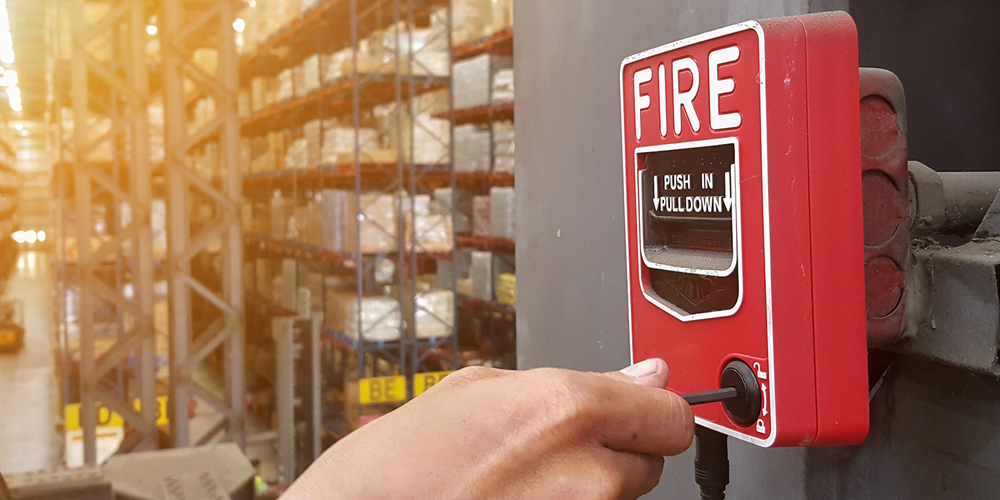
NR Square Enterprises is a Mumbai based, contractor offering wide range of Firefighting, Fire Alarm, Public Address, CCTV, Access Control services with different agencies, Site Survey, Designing of all kinds of Fire Fighting systems, Preparation of BOQ / Tender.
Currently NR Square Enterprises is working with Semi Government & leading private organizations. Our approach is to provide most reliable firefighting solutions and cost-effective services to our clients. As a dynamic leader we can provide a diverse range of top-quality services and installations all over India.
We are Specialized in:
Fire Alarm and Detection Systems
Fire alarm and detection systems are critical components of fire safety in buildings. They are designed to detect the presence of fire, alert occupants, and initiate appropriate actions to mitigate the risk. These systems play a crucial role in protecting lives and property by providing early warning and facilitating timely evacuation.
Key features in Fire Alarm and Detection Systems:
Smoke Detectors: Smoke detectors are devices that detect the presence of smoke, which is often the earliest indicator of a fire. There are different types of smoke detectors, including ionization and photoelectric detectors, which use different sensing techniques.
Heat Detectors: Heat detectors are designed to sense the rapid rise in temperature caused by a fire. They are particularly useful in areas where smoke detectors may not be suitable, such as dusty or humid environments.
Flame Detectors: Flame detectors are specialized devices that detect the presence of flames or infrared radiation emitted by fires. They are commonly used in areas with high-risk materials, such as chemical plants or oil refineries.
Fire Alarm Control Panel (FACP): The FACP serves as the central hub of the fire alarm system. It receives signals from various detectors and triggers appropriate alarm notifications, such as audible and visual alarms, and may also activate suppression systems like sprinklers or gas-based extinguishing systems.
Notification Devices: These devices include sirens, horns, strobe lights, and other audible and visual alarms. They are strategically placed throughout the building to alert occupants in the event of a fire. Modern systems may also incorporate voice evacuation systems to provide clear instructions and guidance.
Manual Call Points: Manual call points, or pull stations, are manual activation devices placed at easily accessible locations. When someone identifies a fire, they can activate the alarm system by manually triggering the call point.
Monitoring and Communication: Fire alarm systems can be connected to a monitoring service or a control room. This allows for real-time monitoring, immediate response coordination, and remote notification to emergency services.
Integration with Other Systems: Fire alarm systems can be integrated with other building systems, such as HVAC (Heating, Ventilation, and Air Conditioning) systems, access control systems, and emergency lighting. This integration enables coordinated responses and enhanced safety measures during an emergency.
It's important to note that fire alarm and detection systems should be installed, inspected, tested, and maintained regularly by qualified professionals to ensure their proper functioning and compliance with relevant regulations and standards.
Fire Alarm and Detection Systems application Industries
Fire alarm and detection systems are crucial for ensuring the safety and protection of people, property, and assets in various industries.
Commercial Buildings: Fire alarm systems are widely used in commercial buildings, including office complexes, shopping malls, hotels, restaurants, and retail stores. These systems help to detect and alert occupants about potential fires, allowing for prompt evacuation and reducing the risk of injuries or fatalities.
Industrial Facilities: Industries such as manufacturing plants, warehouses, factories, and refineries utilize fire alarm and detection systems to monitor and detect fires in their facilities. These systems help to protect expensive equipment, materials, and the safety of workers by providing early warning and initiating appropriate fire suppression measures.
Healthcare Facilities:Hospitals, clinics, nursing homes, and other healthcare facilities rely on fire alarm systems to ensure the safety of patients, staff, and visitors. These systems play a vital role in detecting fires, enabling quick response, and facilitating the orderly evacuation of patients, particularly those with limited mobility.
Educational Institutions: Schools, colleges, universities, and other educational institutions implement fire alarm systems to safeguard students, faculty, and staff. These systems help to detect fires in classrooms, laboratories, dormitories, and other areas, allowing for swift evacuation and minimizing the potential for injuries or casualties.
Residential Buildings: Residential complexes, apartment buildings, and condominiums are equipped with fire alarm systems to protect residents from fire hazards. These systems provide early warning in the event of a fire, enabling occupants to evacuate safely and alerting emergency responders promptly.
Data Centres: Fire alarm and detection systems are essential in data centres, where valuable information and technology infrastructure are housed. These systems help to detect any signs of fire or overheating, allowing for quick response and mitigation to prevent data loss and damage to critical equipment.
Transportation Infrastructure: Fire alarm systems are installed in airports, train stations, subway systems, and other transportation hubs to ensure the safety of passengers and employees. These systems help in detecting fires in crowded areas and alerting the relevant authorities for immediate action.
Hospitality and Entertainment: Hotels, resorts, casinos, theatres, and other hospitality and entertainment venues implement fire alarm systems to protect guests and staff. These systems help to detect fires in guest rooms, public areas, kitchens, and other spaces, facilitating rapid evacuation and reducing the risk of fire-related incidents.
It's important to note that fire alarm and detection system requirements may vary based on local regulations and industry-specific standards. Consulting with fire protection professionals or relevant authorities is crucial to ensure compliance and the most effective fire safety measures for specific applications.
